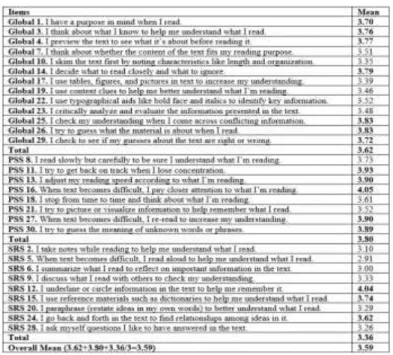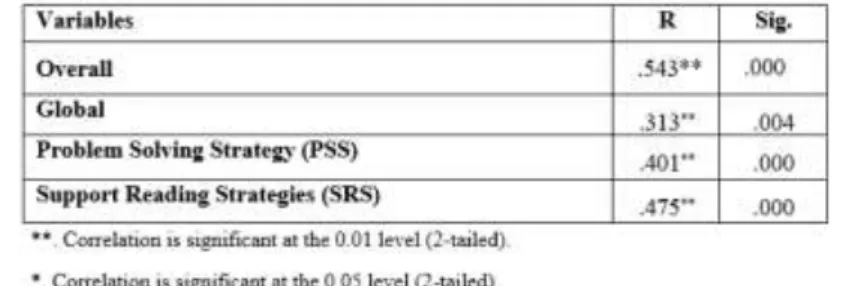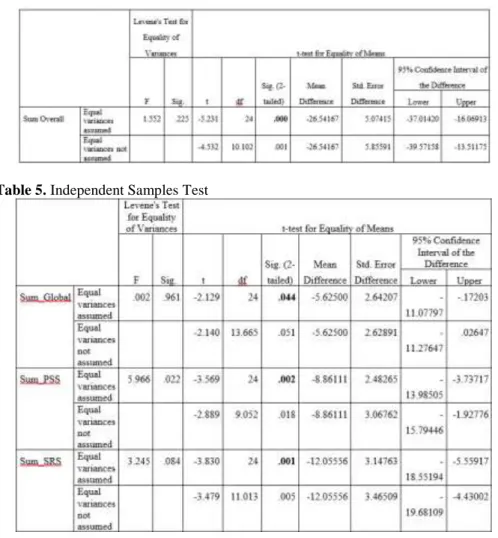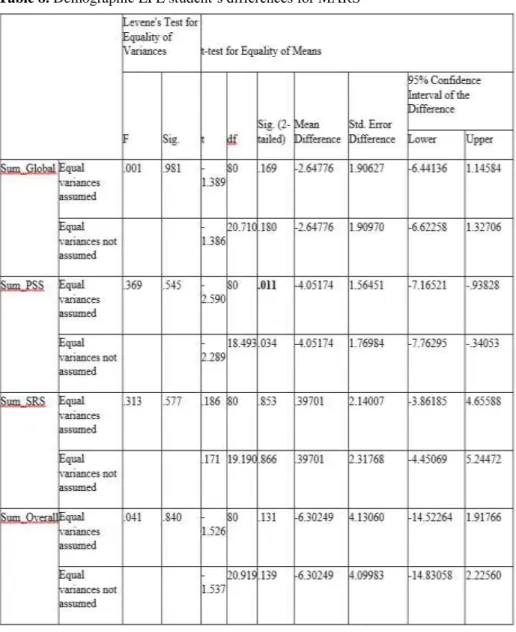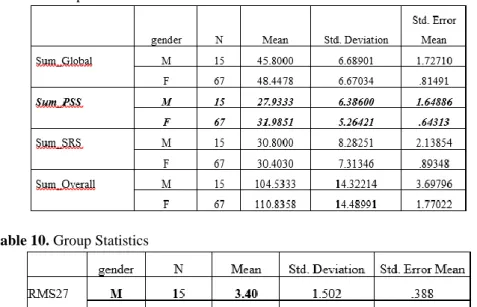Atatürk Üniversitesi Sosyal Bilimler Enstitüsü Dergisi, Mart 2017 21(1): 159-172
Metacognitive Awareness of Turkish EFL Learners on Reading
Strategies
Arif SARIÇOBAN
()Bahram Mohammadi BEHJOO
(*) Abstract: This exploratory study seeks the effects of metacognitive awareness of reading strategies on reading comprehension skills of Turkish EFL students. To do so, a total of 82 freshman EFL students have responded to a 30-item questionnaire of Metacognitive Awareness Reading Strategies Inventory (MARSI) developed by Mokhtari and Reichard (2002). The MARSI comprises three dimensions: Global, Problem Solving, and Support. The results have indicated that the students frequently use these dimensions while they are reading texts to varying degrees. In addition, results have indicated that there is an overall significant relation between MARS and students reading skills in terms of achievement. High successful ones prefer utilizing their problem solving strategies (M=3.95) more than the other two (M=3.80 for Global; M=3.56 for SRS). As to the gender, the results have shown no significant difference between male and female EFL students in general. However, they only differ in PSS, which clearly indicates that females have higher mean scores than males in PSS.Keywords: Metacognitive awareness, reading strategies, achievement, EFL learners
Türk İngilizce Öğrencilerinin Okuma Stratejileri üzerine Üstbilişsel
Farkındalığı
Öz: Bu araştırma, İngilizce öğrencilerinin okuma anlama becerileri üzerine okuma stratejilerinin üstbilişsel farkındalığının etkilerini incelemektedir. Bu amaçla, toplamda üniversite düzeyinde birinci sınıf 82 İngilizce öğrencisi, Mokhtari ve Reichard (2002) tarafından geliştirilen Üstbilişsel Farkındalık Okuma Stratejileri Envanteri (MARSI) ile hazırlanan 30 maddelik bir ankete katılmıştır. MARSI, küresel, problem çözme ve destek olmak üzere üç boyutu kapsamaktadır. Araştırmanın sonuçları öğrencilerin metinleri okurken bu üç boyutu değişen oranlarda sıklıkla kullandığını göstermiştir. Buna ek olarak, sonuçlar toplamda başarı bakımından öğrencilerin okuma becerileri ve MARS arasında önemli bir ilişki olduğunu da göstermiştir. Yüksek başarı oranına sahip olanlar problem çözme stratejilerini (M=3.95) kullanmayı diğer iki boyuttan (Küresel için M=3.56; SRS için M=3.56) daha çok tercih etmektedir. Sonuçlar, cinsiyet bakımından genel olarak erkek ve kadın İngilizce öğrencileri arasında önemli bir farkın olmadığını göstermektedir. Ancak PSSde farklılık göstermektedirler. Bu durum PSSde kadınların erkeklerden daha yüksek ortalamalara sahip olduğunu açıkça göstermektedir.
Anahtar Kelimeler: Üstbilişsel farkındalık, okuma stratejileri, başarı, İngilizce öğrencileri
Makale Geliş Tarihi: 17.12.2016 Makale Kabul Tarihi: 09.03.2017
) Prof. Dr.,Selçuk Üniversitesi, Edebiyat Fakültesi, İngiliz Dili ve Edebiyatı Bölümü (e-posta: saricobanarif@gmail.com)
)Hacettepe Üniversitesi, İngiliz Dili Eğitimi Doktora Öğrencisi (e-posta:
I. Introduction
Among the four language skills, reading is perhaps the most frequently used one by speakers of English as a foreign or second language. Reading is the kind of process in which one needs to not only understand its direct meaning, but also comprehend its implied ideas. As Tierney (2005:51) states, “Learning to read is not only learning to recognize words; it is also learning to make sense of texts.” It involves a great deal of cognitive capacity available for comprehension (Pressley, 2002). For example, good readers know that comprehension is most likely to occur from reading actively. They know how to relate what is being read to prior knowledge, how to predict what might be coming up in the text, how to ask questions while reading, construct images of ideas being conveyed in the text, and summarize what is being read (Pressley, 2002). These comprehension strategies are metacognitive concepts in reading. Contributory metacognitive reading strategies are essential in reading comprehension in that students plan, monitor, regulate and evaluate their reading activities. If students are capable of comprehending what they are reading through a variety of strategies, they will create an interested and self-regulative attitude toward the path of academic achievement. Research has demonstrated that reading comprehension does not just understand words, sentences, or texts, but involving a complex integration of the reader’s prior knowledge, language proficiency and their metacognitive strategies (Hammadou, 1991). Students who read well are found good users of such strategies. Teaching students to elicit questions when they read also positively affects their comprehension. In addition, students are more likely to recall main ideas in the text if they are instructed to summarize as they read (Pressley & Fingeret, 2005). Reading comprehension and comprehension strategies have been widely discussed and studied accordingly.
Reading comprehension is specifically the basic goal for ESL/EFL students to gain an understanding of the world and of themselves, enabling them to think about and react to what they read (Tierney, 2005). According to Grabe (1991), reading is an essential skill and probably the most important skill for second language learners to master in academic contexts. Since reading comprehension has been distinctively important both in first and second/foreign language, reading strategies are of great interest to the field of reading research. In recent years, it has also shed light on metacognitive awareness of reading strategies, perception of strategies, and strategy use/training in reading comprehension.
A variety of reading strategies advocated by second language learning theorists to teach students to read well include skimming, scanning, contextual guessing, skipping unknown or ambiguous words, critical reading, making inferences, etc., all of which are recognized as traditional reading skills (Carrell, 1989). In recent years, some investigators such as Hosenfeld and Block used think-aloud techniques and text structure recognition. They found that individual learners’ greater progress in developing their reading skills after one semester in college (Carrell, 1989). Flavell, J. H., J. R. Speer, et al. (1981) pointed out that if a reader is aware of what is needed to perform effectively, it is possible to take steps to meet the demands of reading comprehension more efficiently. Hence, adding knowledge of metacognition and
self-Metacognitive Awareness of Turkish EFL Learners on Reading Strategies 161
awareness in reading instruction could greatly increase the positive outcomes in students’ reading comprehension.Some of the researchers like Sheoreya and Mokhtari (2001), Cubukcu (2008), Wang (2009), Ronzano, (2010), Turan, et al. (2010), Dhanapala (2010), Takallou, (2011) conducted researches to determine the effectiveness of the metacognitive reading strategies in EFL and all confirm the effectiveness of teaching metacognitive reading strategies, and also illustrate its positive influences for EFL/ESL learners. Learning what strategies are, how to use them, when and where to use particular strategies, and the importance of evaluating their use is, therefore, key to the development of reading comprehension for students whose first language is not English.
This study aims to assess EFL Turkish student’s metacognitive reading strategies awareness and looks for finding out what learners’ strategy preferences are. Moreover, the study seeks to find out if there is any relationship between learner’s metacognitive strategies awareness and their reading achievement. It also investigates the potential gender differences regarding the metacognitive skills. To do so, the study addresses the following research questions:
II. Research Questions
1. What kind of metacognitive reading strategies do EFL learners most prefer to use?
2. Is there a relationship between Turkish language learner’s metacognitive awareness of reading strategies and their reading achievement?
3. Do successful EFL students differ from unsuccessful ones in terms of metacognitive strategy choice?
4. Are there any differences between male and female EFL in their perceived use of reading strategies while reading academic materials?
III. Method
The research design of this study is both comparative and correlational in nature. Moreover, the study can be considered as a quantitative research because no qualitative research methods such as interviews, observation and case studies were employed. The aim of the study is to find out if there is a relation between metacognitive strategy awareness of EFL freshman learners and their reading skills. Therefore, this research project was primarily a correlational study. Moreover, it tries to compare means between groups such as successful and unsuccessful EFL students’ strategy use. Furthermore, the differences between males and females in strategy use have also been investigated.
The participants of this study were 82 Turkish EFL (English as a Foreign Language) students at Gazi University in Ankara/Turkey. There were 15 males (18.30%) and 67 females (81.70%) EFL Turkish freshman students enrolled in the study. The researchers administered the questionnaire to those who attended reading classes on the test administration day. Therefore, the sampling can be said to be a convenient one. The
data for the study were collected through a questionnaire, Metacognitive Awareness of
Reading Strategies Inventory (MARSI) Version 1.0 by Mokhtari and Reichard (2002).
It has totally 30 items and comprises three dimensions, namely Global Reading
Strategies (Global) consisting of 13 items, Problem Solving Strategy (PSS) 8 items and Support Reading Strategies (SRS) 9 items. It uses a five-point Likert scale: 1 means “I
never or almost never do this”, 2 means “I do this only occasionally”, 3 means “I sometimes do this.” (About 50% of the time), 4 means “I usually do this”, 5 means “I always or almost always do this.” The reliability of the instrument is reported at .93, indicating a reasonably reliable questionnaire to measure the metacognitive awareness of reading strategies. In this study the internal consistency reliability coefficient, as determined by the Cronbach’s alpha value, for all items of the questionnaire was .79, which indicates a rather high measure and for dimensions of MARSI (Global, PSS and SRS) the Cronbach’s alpha value shows 0.78, 0.60, and 0.62 respectively (Table 1)
Table 1. Characteristics and Score Categories of MARSI and its Subscales
Component Number of Items Range Likert-scale
Global 13 0 – 65 5 points
PSS 8 0 – 40 5 points
SRS 9 0 – 45 5 points
Overall 30 0 – 150
After collecting data, the participants were classified into three different groups according to the grading system of the related university where this research was conducted; (1) low successful group that included those with mid-term grades ranging from 0 to 49, (2) moderate group with mid-term grades ranging from 50 to 79, and finally (3) high successful group whose mid-term grades ranged from 80 to 100. It should be noted that the age of participants was not included in this study. Apart from this, the level of use of metacognitive strategies are determined in-between the following mean intervals: (a) high between 4-5, (b) moderate between 3-3.9, and (c) low between 0-2.9.
In order to probe and examine the effects of metacognitive awareness reading comprehension SPSS version 17.0 for Windows was used to obtain descriptive statistics and related computations. Pearson Correlation analysis was used to determine the potential relationship between the dependent and independent variables. Also, in order to understand the difference between (a) successful and unsuccessful readers and (b) gender factors in terms of metacognitive reading strategy use, independent sample t-test was used.
IV. Results and Discussion
1. What kind of metacognitive reading strategies do EFL learners most prefer to use?
A careful analysis of Table 2 indicates that students use strategies moderately when they are reading academic texts (M=3.59). As indicated in the table below, the highest
Metacognitive Awareness of Turkish EFL Learners on Reading Strategies 163
mean scores for EFL students in this study has been observed in Problem Solving
Strategies (PSS) (M=3.80) and Global Strategies (M=3.62). The least strategy type has
been observed in Support Reading Strategies (SRS) (M=3.36). Among these strategies the highest mean scores have been obtained in PSS (M=4.05 for Item 16) and SRS (M=4.04 for Item 12). That means students pay closer attention to what they are reading when text becomes difficult and they try to underline or circle information in the text to help them remember it. However, there are quite interesting results in terms of the preference by the students in employing metacognitive strategies in reading in that they try to get back on track when they lose concentration (M=3.93), adjust their reading speed according to what reading when text becomes difficult (M=3.90), re-read to increase their understanding (M=3.90), and lastly try to guess the meaning of unknown words or phrases (M=3.89). Moreover, they check their understanding when they come across conflicting information (M=3.83) and try to guess what the material is about when they read (M=3.83).
On the other hand, the least used strategy type among these three dimensions has been found to be Support Reading Strategies (SRS) (M=3.36). They report that when text becomes difficult, they try to read it aloud to understand (M=2.91). Relying on this finding, reading aloud technique is not mostly preferred by ELT learners. Instead, silent reading can be a choice for reading comprehension. Another striking point is that they seem not to favor summarizing what they read to reflect on important information in the text much (M=3.00).
2. Is there a relationship between Turkish language learner’s metacognitive awareness of reading strategies and their reading achievement?
To find out if there is any relationship between language learners’ reading skills and their metacognitive awareness in reading strategies, Pearson Product Moment
Correlation Coefficient analysis has been conducted and the results in Table 3 below
have revealed that there is an overall significant and positive correlation between Turkish language learner’s metacognitive awareness of reading strategies and their reading achievement (r=.543, P<.01). Moreover, the results of reliability effect test, according to Cohen (1988), revealed a high level of correlation coefficient (r=.543, p<0.01) between MARS of EFL freshman learners in general and their reading achievement. Cohen’s (1988) correlation effect indexes for small, moderate and high levels of correlation coefficient between dependent and independent variables are .10 to .29, .30 to .49 and .50 to 1, respectively.
Table 3 also shows the correlation coefficients calculated for the subcomponents of metacognitive reading strategies. The second correlation analysis was conducted to find out whether there is a correlation between EFL learners’ reading achievement and
Global subscale of MARS. The results have indicated that there is a statistically
significant positive correlation between Global (r= .313, P< .01) and EFL learners’ reading achievement. Moreover, the reliability effect test, Cohen (1988), revealed that there is a moderate level of correlation (r =.313, p<0.01) between the variables measured.
A similar finding has been observed for the correlation between PSS and the participants’ reading achievement (r=.475, p<0.01). Relying on this finding it can be said that the correlation is at a moderate level, too, according to Cohen’s (1988) reliability effect test.
As for the SRS component, the correlation coefficient has been obtained as r=.475 at .000 significance level, which once again indicates a moderate correlation in-between the two variables, namely SRS and reading achievement of the participants.
Table 3. The correlation between MARS of EFL freshman learners and their reading
achievement
3. Do high successful EFL students differ from low successful ones in terms of metacognitive strategy choice?
An independent sample t-test is conducted in order to find out if there is any difference between the high successful EFL students and the low successful ones in relation to
Metacognitive Awareness of Turkish EFL Learners on Reading Strategies 165
their metacognitive strategy choice. A careful analysis of Table 4 simply indicates that there is a statistically significant difference between the high successful and the low successful learners in terms of metacognitive strategy choice (Sig. (2-tailed), .000).
Table 4. Independent Samples Test
Table 5. Independent Samples Test
Table 6 and 7 below simply indicate that the significant difference between the high successful and the low successful students has been observed in having a purpose in mind when they read (M=3.94 for high group; M=3.25 for low group), discussing what they read with others to check their understanding (M=3.78 for high group; M=3.00 for low group), adjusting their reading speed according to what they are reading (M=4.17 for high group; M=3.00 for low group) and in the end they like to go back and forth in
the text to find relationships among ideas in it (M=3.94 for high group; M=2.88 for low group).
Table 6. Independent Samples Test
Table 7. Group Statistics
4. Are there any differences between male and female EFL in their perceived use of
reading strategies while reading academic materials?
As for the relationship between MARS and its dimensions with gender, the findings of independent sample t-test given in Table 8 have shown no significant difference between male and female EFL students (t=-1.526, sig. .131). However, Table 8 also indicates the fact that the two groups only differ in PSS (t=-2.590, sig. .011). As a result it can be asserted that females have higher mean scores (M=31.98) than males
Metacognitive Awareness of Turkish EFL Learners on Reading Strategies 167
(M=27.93) in PSS (Table 9). It can be asserted that female students usually prefer to re-read the text to increase their understanding (M=4.0), while males sometimes prefer to re-read the text (M=3.40) when they think that the text becomes difficult and complicated (Table 10).
Table 9. Group Statistics
Table 10. Group Statistics
V. Discussion and Conclusion
This study aims to investigate the awareness of metacognitive strategies in terms of EFL students’ preferences and the relationship between the metacognitive strategy use and the reading achievement of the participants in general. The study also aims to see in which metacognitive strategies do the high successful EFL learners and the low ones differ, too. This peculiarity was also sought in terms of gender factor.
Among the metacognitive strategies Problem Solving Strategy (PSS) is the one that is mostly preferred by the participants (M=3.80). They most like paying closer attention to what they are reading when the text becomes difficult. That is to say, they try to guess the meaning of unknown words or phrases. This indicates that they are approaching to difficulties and trying to comprehend rather to escape from difficulties. It will help them too be good readers and they will read academic text enthusiastically and critically rather impotently. These are mainly effects on learners’ long-term positive learning.
Moreover, the second preferred dimension is “Global Strategies”. The mean scores for this dimension ranged from 3.35 to 3.83. Within this dimension, items 25 and 26 marked as frequently used items by the EFL students. Global strategy assists students to plan and create a purpose of reading in their mind. Moreover, they use techniques such as pre-reading, taking an overall view of the text, seeing how the text is organized and then decide what to read closely and what to ignore. Utilizing visuals like pictures, figures or tables and paying attention to the words or sentences in bold face and italic help them to figure out the concept of the text.
Metacognitive Awareness of Turkish EFL Learners on Reading Strategies 169
Finally, SRS is found the third preference of EFL students. The lowest mean score is 3.10 and the highest mean score is found 4.04 in (SRS Item 12), indicating that they frequently used underlining the important information technique. In addition, they use other techniques like taking notes, using a dictionary, reading aloud, restating ideas in their own words, and asking questions and answering by themselves. All these techniques help EFL students to better understand the text and increase remembering. The results, as determined by Pearson Correlation analysis between overall MARS and EFL student’s skills have revealed a significant positive relationship between them. Findings of analysis have also indicated that there are significant positive relationships between the components of MARS (Global, PSS, and SRS) and EFL students reading achievement. This means that when freshman EFL students’ metacognitive strategy awareness increases, their success increases, too.
Cohen’s (1988) correlation effect indexes for low, moderate and high levels of correlation between dependent and independent variables are .10 to .29, .30 to .49 and .50 to 1 respectively. Therefore, for overall it can be said that there is a high level of correlation between dependent and independent variables, and for the three components (Global, PSS, and SRS) a moderate correlation has been found. It means that MARS and English reading achievement are related and play a role in students’ reading comprehension skills to a certain degree. It is a logically acceptable fact that the more the students use metacognitive strategies, the more likely they are to obtain higher scores on the reading comprehension test. Zhang, L. and Seepho, S. (2013) investigated the metacognitive strategies of third-year English major students in academic reading at Guizhou University in China. Their findings have indicated a significant positive correlation between metacognitive strategy use and English reading achievement, too.
This exploratory study also seeks to find out whether there is a difference between successful and unsuccessful readers or not. According to the results, there are significant differences between overall and two dimensions namely PSS and SRS metacognitive awareness of the reading strategies of learners of English as a foreign language. Results have revealed that there is no significant difference between students’ MARS and their successes in reading in Global dimension. This means that high successful ones prefer utilizing their problem solving strategies (M=3.95) more than the other two (M=3.80 for Global; M=3.56 for SRS). Among the global strategy use, they like to decide what to read closely and what to ignore, preview the text to see what it’s about before reading it, try to guess what the material is about when they read, have a purpose in mind when they read, think about whether the content of the text fits my reading purpose, and finally check their understanding when they come across a conflicting information.
As to the problem solving strategy use, they prefer to adjust their reading speed according to what they are reading, pay closer attention to what they are reading and re-read to increase their understanding when text becomes difficult, try to get back on track when they lose concentration, and try to guess the meaning of unknown words or phrases.
Lastly they like to underline or circle information in the text to help them remember it, go back and forth in the text to find relationships among ideas in it, use reference materials such as dictionaries to help them understand discuss it with others to check their understanding, and paraphrase (restate ideas in their own words) to better understand what they read.
Zhang and Seepho (2013) point out the difference between high proficiency and low proficiency is in the students’ ability to monitor skills during reading that is vital for the reading achievement. The report that the main reason is students’ metacognitive awareness and applying the strategies. The important effect of MARS is that students can recognize when and where use specific strategy according to the text they are reading.
Zhang (2009) investigated metacognitive awareness and reading strategy use of Chinese senior high school students who were learning English as a foreign language (EFL). The findings indicated that the main effect for strategies and learners’ proficiency were significant. The study also revealed that Chinese senior high school students were active EFL reading-strategy users and that their pattern of strategy use was closely related to their overall EFL achievement.
To conclude, finding of most studies like this study indicate the effectiveness of metacognitive awareness reading strategies. Zhang and Seepho (2013:63) believe that
“Readers with metacognitive strategies have definite reading goals and know how to accomplish them. They can insist on implementing their plans for reading activities and make appropriate adjustments when necessary, get timely feedback on their reading performance through self-assessment on their own initiative, and take remedial actions accordingly. Therefore, readers with metacognitive strategies are able to read effectively and metacognitive strategies constitute an important factor of reading efficiency.”
In addition, proficient readers are those who are purposeful and strategic because those who appropriately use metacognitive skills want to make meaningful connections in their reading and related them to their background knowledge. They use them in particular comprehension tasks. A metacognitive approach to reading consistently requires readers to clearly identify reading purposes, relevant prior knowledge and try to get the main point of view.
References
Carrell, P. L. (1989). Metacognitive Awareness and Second Language Reading. The
Modern Language Journal, 73(2), 121-134.
Cohen, J. W. (1988). Statistical power analysis for the behavioral sciences (2nd end). Hillsdale, NJ: Lawrence Erbaum Associates.
Metacognitive Awareness of Turkish EFL Learners on Reading Strategies 171
Cubukcu F., (2008). Enhancing vocabulary development and reading comprehension through metacognitive strategies. Issues in Educational Research, 18(1), Dhanapala K.V., (2010). Student’s Metacognitive awareness of L2 Reading Strategies.
Journal of International Development and Cooperation, Vol, 16, No.1, pp65, 82.
Flavell, J. H., J. R. Speer, et al. (1981). "The Development of Comprehension Monitoring and Knowledge about Communication." Monographs of the Society for Research in Child Development 46(5): 1-65.
Grabe, W. (1991). Current Developments in Second Language Reading Research.
TESOL Quarterly, 25(3), 375-406.
Hammadou, J. (1991). Interrelationships among prior knowledge, inference, and language proficiency in foreign language reading. The Modern Language
Journal, 75, 27–38.
Pressley, M. (2002). Metacognition and self-regulated comprehension. What research
has to say about reading instruction, 3, 291-309.
Pressley, M., & Fingeret, L. (2005). What We Have Learned Since the National Reading Panel: Visions of a Next Version of Reading First.
Ronzano S.J, (2010). Effectiveness of Metacognitive Strategies for Improving Reading Comprehension in Secondary Students. UMI Number: 342744.
Sheoreya R., Mokhtari K, (2001). Differences in the meta-cognitive awareness of reading strategies among native and non-native readers. System 29 (2001)
431–449.
Tierney, J. E. R. R. J. (Ed.). (2005). Reading Strategies and Practices (Sixth ed.).
Boston:Pearson Education, Inc.
Turan T., Tolga K., Saadet Aylin Bayarc, Volkan, (2010). BayarcMetacognitive awareness of grades 6, 7 and 8 students in reading process. Procedia Social
and Behavioral Sciences 2. 4193–4199. Elsevier.
Takallou F. (2011). The Effect of Metacognitive Strategy Instruction on EFL Learners’ Reading Comprehension Performance and Metacognitive Awareness. Asian
EFL Journal.
Wang M.T , (2009). An Effects of metacognitive reading strategy instruction on efl high school students’ reading comprehension, reading strategies awareness, and reading motivation. UMI 3400319.
Zhang L.J, (2009). Chinese senior high school EFL students’ meta-cognitive awareness and reading-strategy use. Reading in a Foreign Language April 2009,
Zhang, L. and Seepho, S. (2013). Metacognitive Strategy Use and Academic Reading Achievement: Insights from a Chinese Context. Electronic Journal of
